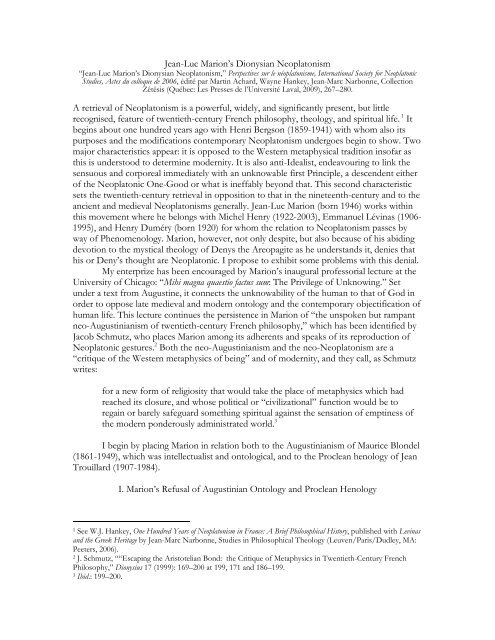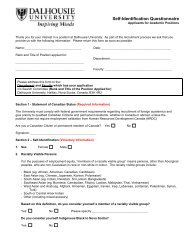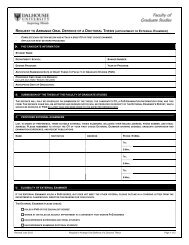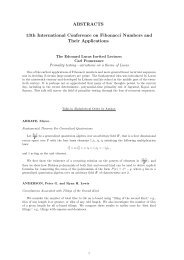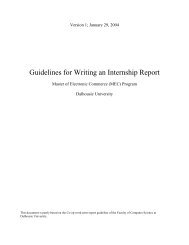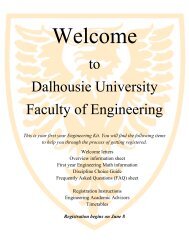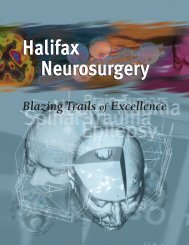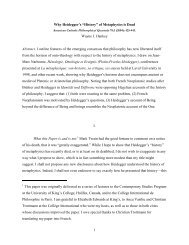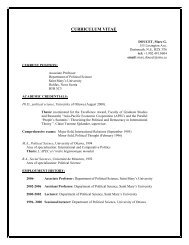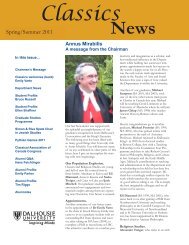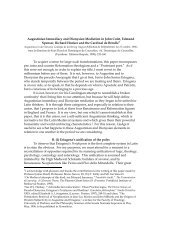Jean-Luc Marion's Dionysian Neoplatonism
Jean-Luc Marion's Dionysian Neoplatonism
Jean-Luc Marion's Dionysian Neoplatonism
Create successful ePaper yourself
Turn your PDF publications into a flip-book with our unique Google optimized e-Paper software.
<strong>Jean</strong>-<strong>Luc</strong> Marion’s <strong>Dionysian</strong> <strong>Neoplatonism</strong><br />
“<strong>Jean</strong>-<strong>Luc</strong> Marion’s <strong>Dionysian</strong> <strong>Neoplatonism</strong>,” Perspectives sur le néoplatonisme, International Society for Neoplatonic<br />
Studies, Actes du colloque de 2006, édité par Martin Achard, Wayne Hankey, <strong>Jean</strong>-Marc Narbonne, Collection<br />
Zêtêsis (Québec: Les Presses de l’Université Laval, 2009), 267–280.<br />
A retrieval of <strong>Neoplatonism</strong> is a powerful, widely, and significantly present, but little<br />
recognised, feature of twentieth-century French philosophy, theology, and spiritual life. 1 It<br />
begins about one hundred years ago with Henri Bergson (1859-1941) with whom also its<br />
purposes and the modifications contemporary <strong>Neoplatonism</strong> undergoes begin to show. Two<br />
major characteristics appear: it is opposed to the Western metaphysical tradition insofar as<br />
this is understood to determine modernity. It is also anti-Idealist, endeavouring to link the<br />
sensuous and corporeal immediately with an unknowable first Principle, a descendent either<br />
of the Neoplatonic One-Good or what is ineffably beyond that. This second characteristic<br />
sets the twentieth-century retrieval in opposition to that in the nineteenth-century and to the<br />
ancient and medieval <strong>Neoplatonism</strong>s generally. <strong>Jean</strong>-<strong>Luc</strong> Marion (born 1946) works within<br />
this movement where he belongs with Michel Henry (1922-2003), Emmanuel Lévinas (1906-<br />
1995), and Henry Duméry (born 1920) for whom the relation to <strong>Neoplatonism</strong> passes by<br />
way of Phenomenology. Marion, however, not only despite, but also because of his abiding<br />
devotion to the mystical theology of Denys the Areopagite as he understands it, denies that<br />
his or Deny’s thought are Neoplatonic. I propose to exhibit some problems with this denial.<br />
My enterprize has been encouraged by Marion’s inaugural professorial lecture at the<br />
University of Chicago: “Mihi magna quaestio factus sum: The Privilege of Unknowing.” Set<br />
under a text from Augustine, it connects the unknowability of the human to that of God in<br />
order to oppose late medieval and modern ontology and the contemporary objectification of<br />
human life. This lecture continues the persistence in Marion of “the unspoken but rampant<br />
neo-Augustinianism of twentieth-century French philosophy,” which has been identified by<br />
Jacob Schmutz, who places Marion among its adherents and speaks of its reproduction of<br />
Neoplatonic gestures. 2 Both the neo-Augustinianism and the neo-<strong>Neoplatonism</strong> are a<br />
“critique of the Western metaphysics of being” and of modernity, and they call, as Schmutz<br />
writes:<br />
for a new form of religiosity that would take the place of metaphysics which had<br />
reached its closure, and whose political or “civilizational” function would be to<br />
regain or barely safeguard something spiritual against the sensation of emptiness of<br />
the modern ponderously administrated world. 3<br />
I begin by placing Marion in relation both to the Augustinianism of Maurice Blondel<br />
(1861-1949), which was intellectualist and ontological, and to the Proclean henology of <strong>Jean</strong><br />
Trouillard (1907-1984).<br />
I. Marion’s Refusal of Augustinian Ontology and Proclean Henology<br />
1 See W.J. Hankey, One Hundred Years of <strong>Neoplatonism</strong> in France: A Brief Philosophical History, published with Levinas<br />
and the Greek Heritage by <strong>Jean</strong>-Marc Narbonne, Studies in Philosophical Theology (Leuven/Paris/Dudley, MA:<br />
Peeters, 2006).<br />
2 J. Schmutz, ““Escaping the Aristotelian Bond: the Critique of Metaphysics in Twentieth-Century French<br />
Philosophy,” Dionysius 17 (1999): 169–200 at 199, 171 and 186–199.<br />
3 Ibid.: 199–200.
A retrieval of <strong>Neoplatonism</strong> is a powerful, widely, and significantly present, but little<br />
recognised, feature of twentieth-century French philosophy, theology, and spiritual life. 1 It<br />
begins about one hundred years ago with Henri Bergson (1859-1941) with whom also its<br />
purposes and the modifications contemporary <strong>Neoplatonism</strong> undergoes begin to show. Two<br />
major characteristics appear: it is opposed to the Western metaphysical tradition insofar as<br />
this is understood to determine modernity. It is also anti-Idealist, endeavouring to link the<br />
sensuous and corporeal immediately with an unknowable first Principle, a descendent either<br />
of the Neoplatonic One-Good or what is ineffably beyond that. This second characteristic<br />
sets the twentieth-century retrieval in opposition to that in the nineteenth-century and to the<br />
ancient and medieval <strong>Neoplatonism</strong>s generally. <strong>Jean</strong>-<strong>Luc</strong> Marion (born 1946) works within<br />
this movement where he belongs with Michel Henry (1922-2003), Emmanuel Lévinas (1906-<br />
1995), and Henry Duméry (born 1920) for whom the relation to <strong>Neoplatonism</strong> passes by<br />
way of Phenomenology. Marion, however, not only despite, but also because of his abiding<br />
devotion to the mystical theology of Denys the Areopagite as he understands it, denies that<br />
his or Deny’s thought are Neoplatonic. I propose to exhibit some problems with this denial.<br />
My enterprize has been encouraged by Marion’s inaugural professorial lecture at the<br />
University of Chicago: “Mihi magna quaestio factus sum: The Privilege of Unknowing.” Set<br />
under a text from Augustine, it connects the unknowability of the human to that of God in<br />
order to oppose late medieval and modern ontology and the contemporary objectification of<br />
human life. This lecture continues the persistence in Marion of “the unspoken but rampant<br />
neo-Augustinianism of twentieth-century French philosophy,” which has been identified by<br />
Jacob Schmutz, who places Marion among its adherents and speaks of its reproduction of<br />
Neoplatonic gestures. 2 Both the neo-Augustinianism and the neo-<strong>Neoplatonism</strong> are a<br />
“critique of the Western metaphysics of being” and of modernity, and they call, as Schmutz<br />
writes:<br />
for a new form of religiosity that would take the place of metaphysics which had<br />
reached its closure, and whose political or “civilizational” function would be to<br />
regain or barely safeguard something spiritual against the sensation of emptiness of<br />
the modern ponderously administrated world. 3<br />
I begin by placing Marion in relation both to the Augustinianism of Maurice Blondel<br />
(1861-1949), which was intellectualist and ontological, and to the Proclean henology of <strong>Jean</strong><br />
Trouillard (1907-1984).<br />
I. Marion’s Refusal of Augustinian Ontology and Proclean Henology<br />
Initially Marion’s refusal of ontology and metaphysics, especially as developed within<br />
modernity, was also a rejection of Augustine. In his Dieu sans l’être of 1982, Marion detached<br />
himself from Augustine’s theological ontology, finding that his interpretation of Exodus 3.14<br />
is at the root of the conception of God as idipsum esse and that “Augustinian thought…finds<br />
1 See W.J. Hankey, One Hundred Years of <strong>Neoplatonism</strong> in France: A Brief Philosophical History, published with Levinas<br />
and the Greek Heritage by <strong>Jean</strong>-Marc Narbonne, Studies in Philosophical Theology (Leuven/Paris/Dudley, MA:<br />
Peeters, 2006).<br />
2 J. Schmutz, ““Escaping the Aristotelian Bond: the Critique of Metaphysics in Twentieth-Century French<br />
Philosophy,” Dionysius 17 (1999): 169–200 at 199, 171 and 186–199.<br />
3 Ibid.: 199–200.
itself…explicitly taken up according to the onto-theo-logical constitution of metaphysics.” 4<br />
Augustine joined Aquinas who already in The Idol and Distance of 1977 had been roundly<br />
criticised for standing within the tradition of onto-theo-logy, because he made being the first<br />
of God’s names. 5 First in the English edition of God Without Being (1991) and later he<br />
recanted these charges against Aquinas. 6 His “In the Name. How to Avoid Speaking of<br />
‘Negative Theology’” of 1999 defends the teaching of Thomas against the accusation of<br />
falling within onto-theology:<br />
Even if Dionysius (or some other) understood the question of God on the basis of<br />
Being, this simple fact would not be enough to establish that he is inscribed within<br />
onto-theo-logy. That is, as we have tried to show in the privileged case of Thomas<br />
Aquinas, if an onto-theo-logy wants to attain conceptual rigor and not remain at the<br />
level of a polemical caricature, it requires first a concept of being, next a univocal<br />
application of this concept to God and creatures, and finally the submission of both<br />
to foundation by principle and/or cause. If these conditions are not met, if in<br />
contrast Being remains an inconceivable esse, without analogy, indeed penitus<br />
incognitum, then the mere fact that Being comes up is not enough to establish an<br />
onto-theo-logy. 7<br />
According to Marion, Aquinas places an irreducible difference between metaphysics<br />
and sacred doctrine allowing him “to think Being by the unknowability of God.” 8 Thomas’<br />
doctrine has been Neoplatonised by Marion so that it has become a kind of theo-onto-logy.<br />
God is before being which he gives even to himself. Marion’s evaluation of Augustine might,<br />
in principle, if his theology is found to subordinate being to God, follow the same path as<br />
his revaluation of Aquinas. This seems to have happened in “Mihi magna.” 9 Significantly this<br />
lecture, like earlier revaluations contains a strong criticism of Heidegger’s assimilation of<br />
Biblical revelation and Greek ontology. 10 Marion’s modification of his following of<br />
Heidegger remains nonetheless incomplete, especially as compared to the thorough<br />
criticisms made by <strong>Jean</strong>-Marc Narbonne which enable a restoration of the Neoplatonic<br />
unification of religion, mysticism, and philosophy. 11 Marion gets around Heidegger through<br />
a separation of the religious from the philosophical in a way that Augustine, Aquinas, Denys<br />
and the later Neoplatonists would not allow. On this account he cannot explain the<br />
unknowability of the divine esse in the three Christian theologians through an historically<br />
accurate embrace of their <strong>Neoplatonism</strong>. In fact, Marion has shifted Augustine and Aquinas<br />
toward Denys, and all three of them toward their Neoplatonic sources.<br />
4 J.-L. Marion, God Without Being, Hors-Texte (Chicago: University of Chicago Press, 1991), 215, note 50.<br />
5 J.-L. Marion, The Idol and Distance, Five Studies (New York: Fordham University Press, 2001), 142 & 212.<br />
6 J.-L. Marion, “Saint Thomas d’Aquin et l’onto-théo-logie,” Revue thomiste 95:1 (1995): 31–66 at 33 & 65.<br />
7 J.-L. Marion, “In the Name. How to Avoid Speaking of ‘Negative Theology’,” in God, the Gift and<br />
Postmodernism, ed. J. D. Caputo and M. J. Scanlon (Bloomingham: Indiana University Press, 1999), 20–53 at 30–<br />
1.<br />
8 Marion, “Saint Thomas d’Aquin,”: 65 note 82; see also 33 note 2. For a later treatment of Aquinas, see idem,<br />
“The Idea of God,” in The Cambridge History of Seventeenth-century Philosophy, ed. D. Garber and M. Ayres, 2 vol.<br />
(Cambridge: Cambridge University Press, 1998), i, 265–7.<br />
9 J.-L. Marion, “Mihi magna quaestio factus sum: The Privilege of Unknowing,” Journal of Religion 85:1 (2005): 1–24<br />
at 4–7.<br />
10 Ibid.: 20–22.<br />
11 J.-M. Narbonne, Hénologie, ontologie et Ereignis (Plotin-Proclus-Heidegger), L’âne d’or (Paris: Les Belles Lettres,<br />
2001).
In reflections on Blondel’s Action, he found something in Augustine which blends<br />
with what his following of Lévinas enabled him to locate in Denys: the infinity of the will as<br />
converted to charity in the Christian tradition leading from Augustine. Thus, Marion’s<br />
attempt “to shoot for God according to his most theological name – charity,” 12 and to move<br />
“hors-texte,” transcending the historical conditions of philosophy, is also Augustinian.<br />
Augustine’s voluntarism attracts him and, like Trouillard, he finds in Blondel “the<br />
conversion of the will,” or charity, by which he turns to God without metaphysics. 13 These<br />
reflections touch the central theme of The Idol and Distance, because he recognises that<br />
Blondel is also concerned to find how will transcends “all its objects as so many idols.” 14<br />
Trouillard, Duméry, and Marion meet because in charity a Neoplatonic move to the One -<br />
Good beyond being, and to the will as free beyond the determinations of the noetic, are<br />
united. Emphasising will and charity in Augustine is not, however, to move against Plotinus,<br />
for whom we are related to the One through “Intellect in love,” as István Perczel shows 15<br />
and George Leroux has reminded us of the Plotinian origins of the notion of a<br />
undetermined free good will. 16<br />
When he turns to Denys, 17 Marion locates his corrective to Western onto-theo-logy<br />
where Trouillard and Duméry found it: a theology without ontology. Although from his first<br />
book on, he adopts from Denys what the Areopagite owes to Proclus and Damascius,<br />
Marion refuses to follow them into henology. In 2001 he declared:<br />
I have never been convinced by the argument that one can pass beyond Being to the<br />
One: this still remains within metaphysics by the simple conversion of the<br />
transcendentals. [Henology] is a insufficient evasion! 18<br />
Something of his motivation may come out in comments where he unexpectedly associates<br />
himself with Claude Bruaire (1932-1986), almost uniquely a French philosopher both calling<br />
himself Catholic and identifying with Hegel’s Absolute Idealism. 19 It was justly said of him:<br />
Nothing is more foreign to the philosophy of Bruaire than apophatic theology which<br />
he repudiates as atheism, and which he situates with good reason inside the sphere of<br />
influence of Neoplatonic metaphysics. 20<br />
Moving from negative to mystical theology, Marion quotes Bruaire:<br />
12 Marion, God without being, xxi; see idem, “The Idea of God,” i, 270–2.<br />
13 J.-L. Marion, “La conversion de la volonté selon ‘L’Action’,” Revue philosophique de la France et de l’Étranger<br />
177:1 (janvier-mars, 1987): 33–46.<br />
14 Ibid.: 38.<br />
15 See I. Perczel, “L’‘intellect amoureux’ et l’‘un qui est’. Une doctrine mal connue de Plotin,” Revue de<br />
Philosophie Ancienne 15 (1997): 223–264.<br />
16 G. Leroux (éd.), Plotin, Traité sur la liberté et la volonté de l’Un [Ennéade VI, 8 (39)], Histoire des doctrines de<br />
l’Antiquité classique 15 (Paris: Vrin, 1990).<br />
17 See my “Denys and Aquinas: Antimodern Cold and Postmodern Hot,” in Christian Origins: Theology, Rhetoric<br />
and Community, ed. L. Ayres & G. Jones (London and New York: Routledge, 1998), 139–184 at 150ff. and<br />
idem, “Self-knowledge and God as Other in Augustine: Problems for a Postmodern Retrieval,” Bochumer<br />
Philosophisches Jahrbuch für Antike und Mittalter 4 (1999): 83–123 at 93–98, for his understanding of Augustine.<br />
18 D. Janicaud, Heidegger en France, 2 vols. Idées (Paris: Albin Michel, 2001), ii, Entretiens 210–27 at 216.<br />
19 D. Leduc-Fagette, “Claude Bruaire, 1932-1986,” Revue philosophique de la France et de l’étranger 177:1 (janviermars,<br />
1987): 5–19 at 13.<br />
20 X. Tilliette, “La théologie philosophique de Claude Bruaire,” Gregorianum 74:4 (1993): 689–709 at 689.
It is therefore necessary to assign negative theology its official place, to give it its<br />
exact status, apart from the pious sentiments which cover with a sensible outer layer,<br />
with religious scraps, the unalterable absolute, sign of the Nothing: negative theology<br />
is the negation of all theology. Its truth is atheism. 21<br />
For Marion henology goes along with atheistical nihilism.<br />
II. Marion and Denys: Negative and Mystical Theology<br />
Marion’s became attached to Denys when a student and understanding what he makes of<br />
him is assisted by attention to one of the priest scholars recuperating <strong>Neoplatonism</strong>, René<br />
Roques (born in 1917), who produced the most important studies of Denys in the last<br />
century. Marion offered a paper to Chanoine Roques’ class of 1972-73 at the École Pratique<br />
des Hautes Études whose title is not far from that of a section in The Idol and Distance: “The<br />
Distance of the Requisite [aitia] and the Discourse of Praise: Denys.” Duméry writes of the<br />
interpretation of Denys by Roques:<br />
M. Roques shows precisely that Denys only received <strong>Neoplatonism</strong> inasmuch as he<br />
was able to adapt it to the inviolable structures of the Old and New Testaments. He<br />
was not a Platonist who would arrive at Christianity as an added extra; he was a<br />
Christian who, without sacrificing any of the demands of his faith, made Platonism<br />
serve as a cultural tool to express what he believes and practices…. Denys’<br />
Platonism does not render his Christianity suspect; it grafts itself upon it and remains<br />
subordinate to it. 22<br />
In The Idol and Distance the religious and apophatic side of <strong>Neoplatonism</strong> provides a<br />
passage around Heidegger’s naming of the idols of Western ontology. However, Marion<br />
accomplishes his purpose by opposing Denys’ Mystical Theology to Neoplatonic theory:<br />
Ascent coincides with the negation of attributes. It is necessary to note that the<br />
denials bear just as easily on the names taken from the sensible (corporeal, figurable,<br />
measurable, variable, etc.), as on the intelligible names themselves, including the<br />
most conventional within <strong>Neoplatonism</strong>: “neither One, nor Unity, nor Divinity, nor<br />
Goodness.” The most appropriate name is found, therefore, no more in the<br />
Plotinian One than in the grossest sensible idol. 23<br />
Marion puts the apophatic “distance” he finds in Denys against the objectifications of<br />
ontological metaphysics and representational subjectivity. Denys’ requirement that “divine<br />
things be understood divinely” demands:<br />
21 J.-L. Marion, “In the Name,” (1999) 49, note 8 quoting Bruaire, Le Droit de Dieu (Paris: Aubier Montaigne,<br />
1974), 21. He quoted the same passage of Bruaire for the same purpose in The Idol and Distance, 146.<br />
22 H. Duméry, Regards sur la philosophie contemporaine (Paris & Tournai: Casterman, 1956), 38.<br />
23 Marion, The Idol and Distance, 146.
adically prohibiting that one hold God as an object, or as a supreme being, distance<br />
escapes the ultimate avatar of the language of an object—the closure of discourse,<br />
and the disappearance of the referent. 24<br />
In fact, no Neoplatonist would allow the One to be an object, a subject of predicates, or an<br />
intelligible predicate, and—not alone among the Neoplatonists—Damascius, whose teaching<br />
Denys knows and follows, places the Absolute beyond the One. Marion uses Denys as a<br />
weapon in his battles against contemporary critics of Christian theology by contrasting his<br />
position to the Neoplatonists who bear all its sins. This requires misrepresenting<br />
Neoplatonic transcendence as reaching no higher than the theoretical and as only the<br />
abstraction produced by negation—a Heideggerian understanding of <strong>Neoplatonism</strong>.<br />
Marion’s procedure provides yet another proof that we cannot tell the truth about the<br />
history of philosophy until we have mastered our fear of Heidegger. 25<br />
“In the Name” gives Marion’s most extended consideration of Denys and of<br />
<strong>Neoplatonism</strong> since The Idol and Difference. Despite the decades between the two works, many<br />
fundamental concerns, judgments, and positions are the same. The first is concerned with<br />
the question of whether all theology is assimilated to onto-theology and with the “surprising<br />
coup de force” by which “negative theology” “finds itself…reintegrated within onto-theology.”<br />
In it Marion regards Jacques Derrida’s (1930-2004) différance as leading “us further forward,<br />
certainly not in the way of an answer, but in the seriousness of the question.” 26 “In the<br />
Name” confronts these same matters through staging an encounter between “the two<br />
questions of the ‘metaphysics of presence’ and of ‘negative theology’.” 27 Derrida’s treatment<br />
of these questions becomes central and is critically surveyed. His objections to negative<br />
theology are blamed for their “crudeness;” 28 he aims “to stigmatize ‘negative theology’s’<br />
persistence in making affirmations about God (in particular the affirmation of existence)—<br />
while denying that it does so.” 29 By a third way, “de-nomination,” beyond affirmation and<br />
negation, Marion trumps Heidegger extended through Derrida:<br />
De-nomination, therefore, does not end up in a “metaphysics of presence” that does<br />
not call itself as such. Rather, it ends up as a pragmatic theology of absence—where the<br />
name is given as having no name, not as giving the essence, and having nothing but<br />
this absence to make manifest; a theology where hearing happens….But if essence<br />
and presence, and therefore a fortiori ground and the concept of being, are missing<br />
from this name, one can no longer speak of onto-theo-logy or of metaphysics or<br />
even of a “Greek” horizon. 30<br />
Marion attempts again to get around the reintegration of negative theology into<br />
onto-theology by presenting Denys and his Christian predecessors and successors as<br />
24 Ibid., 140.<br />
25 See my “Why Heidegger’s ‘History’ of Metaphysics is Dead,” American Catholic Philosophical Quarterly 78:3<br />
(2004): 425–443.<br />
26 Marion, The Idol and Distance, 231–2.<br />
27 Marion, “In the Name” (1999), 20.<br />
28 Ibid., 23.<br />
29 Marion, “In the Name: How to Avoid Speaking of It,” in In Excess: Studies of Saturated Phenomena, trans. R.<br />
Horner and V. Berraud, Perspectives in Continental Philosophy (New York: Fordham University Press, 2002),<br />
132.<br />
30 Ibid., 154.
engaged in mystical theology, prayer, and praise. These Marion sets against <strong>Neoplatonism</strong>,<br />
which belongs to metaphysics and the rejected “Greek horizon.” It is no more than a form<br />
of philosophical theoria, and its First Principle consists in a mere substitution of the One or<br />
of the Good for Being—a representation consistent with his judgment on the relation of<br />
henology and ontology. Having pointed to the priority of Good over Being for Denys,<br />
Marion opposes him to the Neoplatonists:<br />
It is not enough simply to declare the horizon of Being to be overstepped by<br />
goodness if one wants to think this transgression. What must be understood by<br />
goodness? In contrast to the Neo-platonists who overcome Being only for the sake<br />
of coming unto the One and would pass beyond the One only in order to retrieve it,<br />
Dionysius not only does not privilege the one which he paradoxically places in the<br />
last position of the divine names; he also does not accord any essential privilege to<br />
goodness—while nonetheless still granting it the title “most revered of names.” 31<br />
Because Denys, in contrast to the Neoplatonists, subordinates negative theology to mystical<br />
theology, he has found “de-nomination”:<br />
With the third way, not only is it no longer a matter of saying (or denying) something<br />
about something, it is also no longer a matter of saying or unsaying, but of referring<br />
to the One who is no longer touched by nomination, a matter no longer of saying<br />
the referent, but of pragmatically referring the speaker to the inaccessible Referent. It<br />
is solely a matter of de-nominating. 32<br />
Marion advises us not to ignore:<br />
the fact that the work of the Greek Fathers consisted precisely in freeing the<br />
Christian theological concepts from the Greek (and perhaps metaphysical) horizon<br />
where they first arose. 33<br />
In contrast to affirmation in prayer and praise or negation in apophatic theology,<br />
Marion grounds the “de-nomination” of Christian mystical theology in a God who is<br />
nameless by excess. In the “third way as saturated phenomenon” “where mystical theology is<br />
accomplished”:<br />
no predication or naming any longer appears possible, as in the second way<br />
[apophasis], but now this is so for the opposite reason: not because the giving<br />
intuition would be lacking…but because the excess of intuition overcomes,<br />
submerges, exceeds, in short saturates, the measure of each and every concept. 34<br />
I shall not analyze Marion’s characterisation of Denys’ thought—inquiring, for<br />
example, whether his representation of the place of the One or the Good in Denys’ theology<br />
illuminates or obscures. I shall rather extend my remarks about his attitude to henology. I<br />
31 Marion, “In the Name” (1999), 31–32; see 23, note 11; 31–32; idem, The Idol and Distance, 146 & 173.<br />
32 Marion, “In the Name” (2002), 142.<br />
33 Marion, “In the Name” (1999), 37.<br />
34 Ibid., 40.
point to a characterisation of <strong>Neoplatonism</strong> within the contemporary French retrieval which<br />
is the very opposite of Marion’s, and note that precisely what he ascribes to Denys in<br />
contradistinction from the pagan Neoplatonists is understood by these scholars as their<br />
proper doctrine. I conclude with some passages from Proclus where he seems to teach<br />
exactly what Marion attributes to Denys.<br />
III. <strong>Jean</strong> Trouillard in Company with Ancient and Contemporary Henology<br />
Contemporary French Neoplatonic scholarship demonstrates both that for the<br />
Neoplatonists the One is nothing and never properly nameable because of its inconceivable<br />
fullness, and also that Proclus and Damascius have anticipated the criticisms of negative<br />
theology and <strong>Neoplatonism</strong> by both Derrida and Marion. 35<br />
For Duméry the mysticism of Plotinus belongs to the realm of grace:<br />
Plotinus…seeks salvation only through the mediation of the intellect, and yet he<br />
demands that the intellect declare itself dependent and insists that attaining the<br />
intelligible is only a stage, although an indispensable one, on the journey toward the<br />
One, toward ecstasy. And since the One is transcendent, the final ecstasy<br />
presupposes a grace. As <strong>Jean</strong> Trouillard observes, only those who link “the idea of<br />
grace to that of contingency” can dispute the fact that Plotinus professed a<br />
mysticism of divine gratuitousness and liberality. Once the transcendence of the One<br />
is admitted, the Plotinian ecstasy must be understood as a religious experience<br />
beyond the intelligible order. This amounts to understanding philosophy as an<br />
intermediary between two presences of the One to the spirit: the one a latent and<br />
unperceived presence, which constitutes the source of all spirituality; the other, a<br />
recognised and willed presence, which, in the dark night of language and meaning, of<br />
the senses and the understanding, consummates the marriage of intelligence with the<br />
Absolute. 36<br />
In the Elements of Theology of Proclus, Trouillard says he encountered “the selfconstituting<br />
character of all authentic being and this made evident to me that in a<br />
monadological perspective the entire procession is intrinsic to each psycho-noetic subject.” 37<br />
Once Proclus is properly understood, the Neoplatonic doctrines of transcendence and of the<br />
soul must be reconceived:<br />
Neoplatonic transcendance is not an absence, but an excess of presence, since it is<br />
for each spirit its interior home of liberation. It is less an end than a point of<br />
departure, less a superior term than a prior state, never participated, always<br />
communicated. It is only exterior to us inasmuch as we are exterior to<br />
ourselves…Since the soul is not only the term of the internal procession, but also the<br />
spontaneous recapitulation of the entire procession from the One to matter, we are<br />
35 This begins with Bréhier’s seminal although largely unappreciated “L’idée du néant et le problème de l’origine<br />
radicale dans le néoplatonisme grec,” but becomes central with Trouillard, Duméry, Joseph Combès, and<br />
Stanislas Breton.<br />
36 H. Duméry, Phenomenology and Religion: Structures of the Christian Institution, Hermeneutics 5 (Berkeley/Los<br />
Angeles/London: University of California Press, 1975), 99.<br />
37 J. Trouillard, L’Un et l’Âme selon Proclos, Collection d’études anciennes (Paris: Les Belles Lettres, 1972), 3–4.
able to resume everything… in a single formula…:“The soul is the perfect mediation<br />
because it is the plenitude of negations….It is in this that it is self-moving.” 38<br />
Coming to union with the Principle is not the work of abstracting reason. In its<br />
transcendent and unparticipated anteriority, the One is without relation to any being or<br />
intellect; its self-communication in the centre of the soul is, therefore, not a substantial<br />
presence, but pure negativity of being. The universe is a series of “rays diverging from the<br />
same universal center.” 39 The soul coincides with that center, as does all authentic being.<br />
Her return is a progressive negation of all that the One is not, and this purifying mediation is<br />
the soul’s construction of herself and the entire cosmos. As with Denys, union requires<br />
theurgy because:<br />
the divine is, in effect, absent from nothing, but it is present equally to all. That is<br />
why, even in beings of the lowest rank, one will discover the divine presence. For the<br />
One is everywhere in the sense that each being owes its subsistence to the gods and<br />
that, in proceeding from the gods, none leave them entirely, but everything is rooted<br />
in the divine. 40<br />
For Trouillard the most attractive Christian system is Eriugena’s where historically<br />
the unification of Augustine and Denys has its first instance. 41 His absence from Marion is<br />
revealing. In Eriugena, according to Trouillard:<br />
God does not know himself. And the reason for this ignorance, is that God is<br />
nothing.… Because it is in the image of God our mind is nothingness, and this is<br />
why it expresses the totality of the universe. Becoming the meanings which it emits,<br />
it creates itself in them, and nevertheless refuses to define itself by its own<br />
creations. 42<br />
As image of God our mind does not comprehend itself—a common Neoplatonic and<br />
Augustinian notion. This is the doctrine of Marion’s “Mihi magna” but Eriugena’s unification<br />
of Denys and Augustine on this point is not mentioned in his lecture. Is this because with<br />
Eriugena the Neoplatonic foundation of both becomes indubitable?<br />
Stanislas Breton (1912-2005) tells us that in consequence of its reference to the One-<br />
Nonbeing of the Parmenides, <strong>Neoplatonism</strong> “is constantly inspired by a self-criticism” 43 and<br />
that this auto-critique reaches its culmination in Damascius. Listen to Joseph Combès (born<br />
1920) on Damascius:<br />
38 Ibid. 4–8.<br />
39 J. Trouillard (éd.), Proclus, Éléments de Théologie, Bibliothèque philosophique (Paris: Aubier, 1965), 24.<br />
40 Ibid., 25<br />
41 See my “Secundum rei vim vel secundum cognoscentium facultatem: Knower and Known in the Consolation of Philosophy<br />
of Boethius and the Proslogion of Anselm,” in Medieval Philosophy and the Classical Tradition in Islam, Judaism and<br />
Christianity, ed. J. Inglis, (Richmond [England]: Curzon Press, 2002), 126-150 at 141–144.<br />
42 J. Trouillard, “Érigène et la naissance du sens,” in Platonismus und Christentum. Festschrift für Heinrich Dörrie, ed.<br />
H.-D. Blume and F. Mann, Jahrbuch für Antike und Christentum Ergänzungsband 10 (Munster:<br />
Aschendorffsche, 1983), 267–276 at 268 & 272.<br />
43 S. Breton, “ Actualité du néoplatonisme,” in Études néoplatoniciennes (Neuchâtel: La Baconnière, 1973), 110–<br />
126 at 123.
The theology of Damascius wants to be aporetic in order to radicalise the<br />
apophatism inherent in it, and to shelter the deposit [received from Plato] from all<br />
discourse, even that discourse which seems to refuse discourse, but which employs it<br />
again in saying that the unique principle of all surpasses all understanding, because by<br />
perfection it is transcendent and superior to all.… Aporeticism will consist therefore<br />
in recognising that the negation of the highest perfections and even of<br />
transcendence, in respect to the principle, is demanded at a still higher degree,<br />
because these are only “our own conventions in respect to it.”…Solely silence<br />
acknowledges, following upon the awareness that the two necessities, criticism and<br />
mysticism, are only able to have, when something so ineffable is being dealt with, the<br />
same height, and that they come together in it. 44<br />
Trouillard writes that Damascius:<br />
discloses the risk which in a permanent way <strong>Neoplatonism</strong> runs just much as does all<br />
negative theology. To use language as a defect in the purity of silence can result in<br />
our making of silence a counter-expression, of night a secret, and of nothingness a<br />
mysterious substance. One inevitably slides into this if one does not practice an<br />
incessant purification. 45<br />
Proclus leads us to the silence of de-nomination. The soul must ascend beyond<br />
naming, beyond philosophical work and striving. For him the negativity of the One is not<br />
“nothingness,” but philosophy cannot tell the difference between negativity by excess and<br />
negativity by defect because we are dealing in both cases with what is unknowable. Hence<br />
we need the pre-noetic operation of the gods’ work. Because union is not only the end but<br />
also the beginning, “inspired impulse” is necessary to rouse the power of the One in the soul<br />
so that she is converted towards God. 46 Reason is inadequate both to the beginning and to<br />
the consummation. Proclus writes:<br />
… dialectical operations are the preparation for the strain towards the One, but are<br />
not themselves the strain. Or rather, not only must [dialectical activity] be eliminated,<br />
but the strain as well. Finally, when it has completed its course, the soul may rightly<br />
abide with the One. Having become single and alone in itself, it will choose only the<br />
simply One. 47<br />
The debates between Derrida and Marion over speech, negative theology, and<br />
mysticism reproduce the concerns of Damascius and Proclus; the moderns are not more<br />
exigent than the ancients. Marion, Trouillard, Combès, Damascius, Denys, Proclus, and<br />
Aristotle conclude with silence. Proclus writes “It is with silence, then, that…[Aristotle]<br />
brings to completion the study of the One.” 48<br />
44 J. Combès, “ La théologie aporétique de Damascius,” in idem, Études néoplatoniciennes, 2 e éd., Collection Krisis<br />
(Grenoble: Millon, 1996), 199–221 at 201–21.<br />
45 J. Trouillard, La mystagogie de Proclos, Collection d’études anciennes (Paris: Les Belles Lettres, 1982), 94.<br />
46 Proclus, In Parm., VI, 1071, 425.<br />
47 Ibid., VII, 75K, 603<br />
48 Ibid., VII, 76K, 603:


